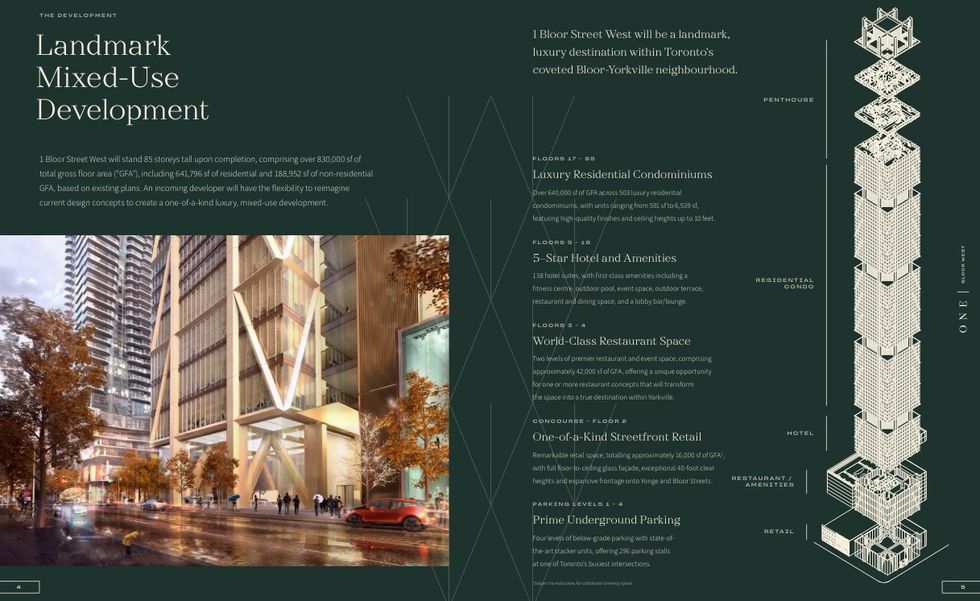After being placed under receivership in October, the Ontario Superior Court officially approved a sales process for The One on Thursday.
The project, which was being developed by Mizrahi Developments, will be listed by JLL with a minimum bid threshold set at $1.2B and a non-binding bid deadline set for July 30, as reported by STOREYS last week.
The sales process was approved following a war of words that played out through court filings this week between the senior secured lender on The One, KEB Hana Bank, and Coco Paving Inc.'s Jenny Coco, who partnered with developer Sam Mizrahi on The One and is a both a 50% owner of the project and a secured lender on the project, through Coco International Inc.
The dispute arose from Coco's accusation, made through a formal Notice of Objection dated June 3, that the sales and investment solicitation process (SISP) that has now been approved is "designed to fail" as a result of the minimum bid threshold, but Coco's notice also ventured into questioning KEB's true intentions, and KEB responded in kind in their own submission to the court.
The Minimum Bid Threshold
"The Coco Parties do not object to a sales process – they have consistently said that should occur," the Notice of Objection states. "However, the Cocos object to the SISP as it has been designed; particularly, the requirement that no bidder may proceed unless it agrees to pay a minimum of $1.2 billion to acquire the project."
The Coco Parties — Jenny Coco is not personally named in the notice — points to the extraordinary price, as well as the fact that the price does not include the cost needed to complete construction.
"If a purchaser must pay $1.2 billion or more to buy the Project and must also invest a further, say, $700 million for example, to complete construction, it will have invested $1.9 billion into the Project. No purchaser will do this unless the Project will yield revenues of at least that amount. It is a certainty under any model or forecast that the Project revenues will not match this amount. It is therefore a certainty that no one will bid $1.2 billion or more."
Responding to the Coco Parties in a written submission to the court dated June 5, KEB pointed out that the minimum bid threshold of $1.2B represents $300M less than the full amount that they are owed — $1.5B — and that KEB is the first-ranking charge holder on the project, to whom Coco is subordinate.
KEB notes that the Coco Parties "tellingly" omitted both of these facts in her objection notice, and that establishing a minimum bid threshold is a benefit to the SISP.
"This reserve bid mechanism is, in the current circumstances, helpful to the process as it signals to potential bidders that the Senior Secured Lenders are prepared to consent to a Transaction Proposal that does not fully repay the amounts owing to them," said KEB. "This ensures that bidders are not frightened off by the potential for the Senior Secured Lenders to credit bid the full [$1.5B]. [...] At the same time, it does not mislead potential bidders who might otherwise invest the time and money to submit a much lower bid in the hope that the Senior Secured Lenders are prepared to negotiate to receive such lower amount."
KEB added that the Coco Parties' objection to a minimum bid threshold amounts to requiring that KEB accept less, which the Coco Parties are not entitled to do.
Designed To Fail?
The Coco Parties also repeats throughout the objection notice that the SISP is designed to fail and also calls it a "commercially unreasonable path."
"It is a certainty, as discussed below, that this bid floor will result in no qualified bids and will deter purchasers from engaging in the SISP," the notice states. "The SISP with this bid floor has been intentionally designed to fail – that is, to produce no bids – so as to then justify permitting the Senior Secured Lenders to finance construction of the Project for the next 3.5 years."
The Senior Secured Lenders have said that if no satisfactory bid is found, they may facilitate the continued construction of The One through a credit bid — bidding its secured debt against the purchase price to acquire the secured collateral — or other restructuring transaction.
The Coco Parties say that the Receiver, Alvarez and Marsal, recognizes that the SISP as designed will produce no bids, but believes that KEB Hana Bank has the right to do so.
"The Coco Parties reject the 'it's their money, they can do as they wish' approach that underlies the SISP and the Receiver's comfort with the SISP," the objection notice states.

The Coco Parties also allege that the SISP is designed to fail because KEB wants to block the sale of the project, saying that "They are imposing a $1.2 billion bid floor that precludes anyone else from buying the Project but they also will not buy the Project – they’re simply blocking the sale of the Project."
Instead, the Coco Parties asked the court to either "dispense with the pretense" of a SISP and proceed to approving the Senior Secured Lenders' plan to finance construction, or approve a SISP "structured to maximize the prospects of receiving bids."
In their response, KEB pointed out that the SISP is seeking bids to acquire the project as well as development proposals to complete the project.
"The Senior Secured Lenders bargained for their first-priority position and they lent a very substantial amount of money to the Project on the strength of those protections," the response states. "Their principal objective in this proceeding is to be repaid, whether that is the result of a Transaction Proposal involving a sale to a third party, a Development Proposal that would result in the construction of the Project and the realization of value at the end of that process, or some other value-maximizing transaction."
A "Disguised" Objection
KEB likely did not appreciate the Coco Parties questioning their motivations and responded in kind, calling out Jenny Coco — who, again, is never personally named in the objection notice — by name in their response.
"The Notice of Objection does not purport to be filed on behalf of Jenny Coco personally," KEB said. "Yet it can be readily inferred that the objection is strongly motivated by Ms. Coco's interests as a personal guarantor both of all amounts owing to the Senior Secured Lenders and of the completion of the Project. While Ms. Coco is no doubt concerned at her very significant exposure in this capacity, the Guarantees are unlimited, unconditional and unqualified. They also contain express comprehensive waivers of any and all guarantor defences. [...] The fact that the 'Coco Parties' Notice of Objection does not even refer to the Guarantees is misleading and does not paint an accurate picture of the Coco Parties' position in this proceeding."
"Although Ms. Coco, in her capacity as Guarantor, is not specifically identified as a party to the Notice of Objection, the failure to include her as one of the 'Coco Parties' is disingenuous," KEB added. "Many of the unsupported objections raised by the Coco Parties in the Notice of Objection [...] are designed to require the Senior Secured Lenders to accept less than the full amount owing to them and to exit this proceeding. This is a thinly disguised attempt to cap the liability owed by Ms. Coco in her capacity as Guarantor under the Guarantees and is contrary to the terms of those Guarantees."
In 2022, Jenny Coco filed a lawsuit against developer Sam Mizrahi claiming that they had reached an agreement that would see Mizrahi buy out Coco's interest in the project, but that Mizrahi failed to do so by the date that was agreed upon.
Despite the Coco Parties' objections, the Ontario Superior Court approved the SISP on Thursday as it was originally proposed.
- The One To Be Listed For Sale At $1.2B, Increased To Over 500 Units ›
- Colliers' Hart Buck & Jennifer Darling On The Uptick In Court-Ordered Sales ›
- Mizrahi’s Yorkville Condo Project Hit With Receivership ›
- Mizrahi Project Near Yonge And Steeles Under Receivership ›
- Court Allows Trump Hotel Vancouver Owner To Sue Ex-Bankruptcy Trustee ›
- 25-Storey Ottawa Project Placed Under Receivership ›
- Site Of Foreclosed 67-Storey AimForce Project In Surrey Listed For $75M ›
- Mizrahi’s Stakes In Yorkville, Vaughan Projects Sold By Court Order ›





















